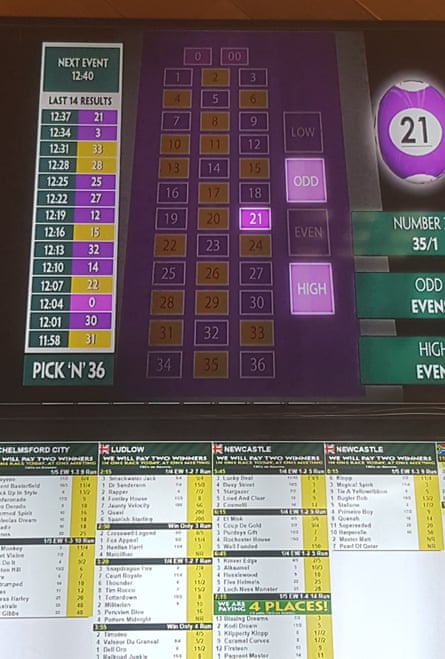Bookmakers have been accused of trying to cheat rules curbing fixed-odds betting terminals (FOBTs) after a Guardian investigation found high-stakes roulette-style games being launched on the same day restrictions on the machines came into force.
A reduction in FOBT stakes from £100 to £2 was introduced on Monday, after the government branded them a “social blight” following a long-running campaign highlighting huge losses suffered by gamblers, some of them addicts.
But less than 48 hours after the industry regulator warned bookmakers against trying to bypass the law, high street firms were accused of doing just that. The Gambling Commission said on Monday it was investigating the new products.
The new games launched by bookmakers Betfred and Paddy Power prompted condemnation from campaigners, former sports minister Tracey Crouch and Labour’s deputy leader Tom Watson, who branded them “FOBTs by the back door”. William Hill is planning a similar product but has yet to launch it.
Sports minister Mims Davies said: “We cut FOBT stakes to £2 to protect vulnerable people from gambling-related harm, and operators should respect both the letter and the spirit of that change.
“We are watching very closely to see how the industry reacts to this measure and will not hesitate to act if we see evidence of harm.”
Betfred began offering a roulette-style game on Monday, even as restrictions on FOBTs were imposed despite vociferous lobbying by bookmakers, who warned 4,500 stores could close at the cost of 21,000 jobs.

The game, called Virtual Cycling, allows gamblers to place bets on a piece of paper obtained over the counter, showing a graphic similar to a roulette table. The game features a maximum stake of £500, five times what was possible on the FOBT games that are now banned. Players bet on when an animated cyclist travelling around a track will be overtaken by virtual competitors, based on numbers corresponding to sections of the track.
A spokesman for Betfred said: “Bets for all these products need to be filled out on a betting slip and handed over at the counter, where our staff can interact with the customers as they do so. These are not machine games but over-the-counter bets.”
The numbers from 1 to 36 echo those featured on a roulette wheel, as does the opportunity to bet on odd or even and groups of numbers.
An employee in one Betfred outlet told The Guardian: “It just came in this morning. It really reminds you of roulette.”
Paddy Power’s game is called Pick ‘n’ 36 and features a maximum stake of £100, the same level as FOBTs before the new restrictions. Like Betfred’s Virtual Cycling game, players bet on numbers between 1 and 36, as well as on other eventualities similar to roulette. A TV screen displays “hot” and “cold” numbers, giving the impression that the numbers selected are not random – a feature heavily criticised by the GambleAware charity.
A staff member in a Paddy Power branch described the game as the “new roulette” and said it had been on trial in several of the company’s 320 stores from Monday. While the stakes are as high as FOBTs, the games are less frequent, running once every three minutes, compared to once every 20 seconds.
The Guardian has approached Paddy Power for comment.
William Hill is testing a game called Wonderball, which will allow customers to stake up to £50 by filling in boxes on a printed roulette board. A draw then takes place on TV screens, with prizes of up to £25,000 available. A betting slip, which will be handed out to customers if the game is launched nationwide, describes it as a “fixed odds betting event”.
“It’s just like roulette but the spin is on the TV screen,” an employee in a William Hill shop told the Guardian, adding that the game was not yet available but was likely to be launched soon.
A William Hill spokesman said: “We are committed to player protection under our ‘nobody harmed’ ambition and any product we may choose to launch will be fully assessed from this standpoint and will only be launched after full engagement with the regulator.”
All of the games technically comply with FOBT laws, which cover £100-a-spin roulette on self-service machines.
But MPs and campaigners lined up to criticise bookmakers for apparently seeking to circumvent the spirit of the rules.
Labour’s shadow culture minister, Tom Watson, said: “These new games seem like FOBTs by the back door and look like a pretty disgraceful example of bad faith by the bookmakers involved. They appear to be trying to cheat the system.
“The gambling industry fought FOBTs reform tooth and nail, never accepting the terrible social harm they caused. They clearly haven’t learned any lessons – if they won’t reform themselves a Labour government is determined to do it for them.”
Tracey Crouch MP, who resigned as sports minister in anger at a proposed delay to FOBT curbs, said: “Any attempts to circumnavigate measures that reduce harm would be morally irresponsible. If bookmakers had taken their responsibilities for player protection more seriously there wouldn’t have been a need for government or regulator intervention.”
Helen Venn, executive director at the Gambling Commission, said: “We are aware of these products and we are investigating. We have been extremely clear about our expectations in relation to how operators should implement the stake reduction. This is why we have been monitoring developments closely and last week we wrote to operators to remind them of their responsibilities to ensure consumers are protected. Where we see businesses failing to act responsibly in response to the stake reduction we will not hesitate to step in.’’
